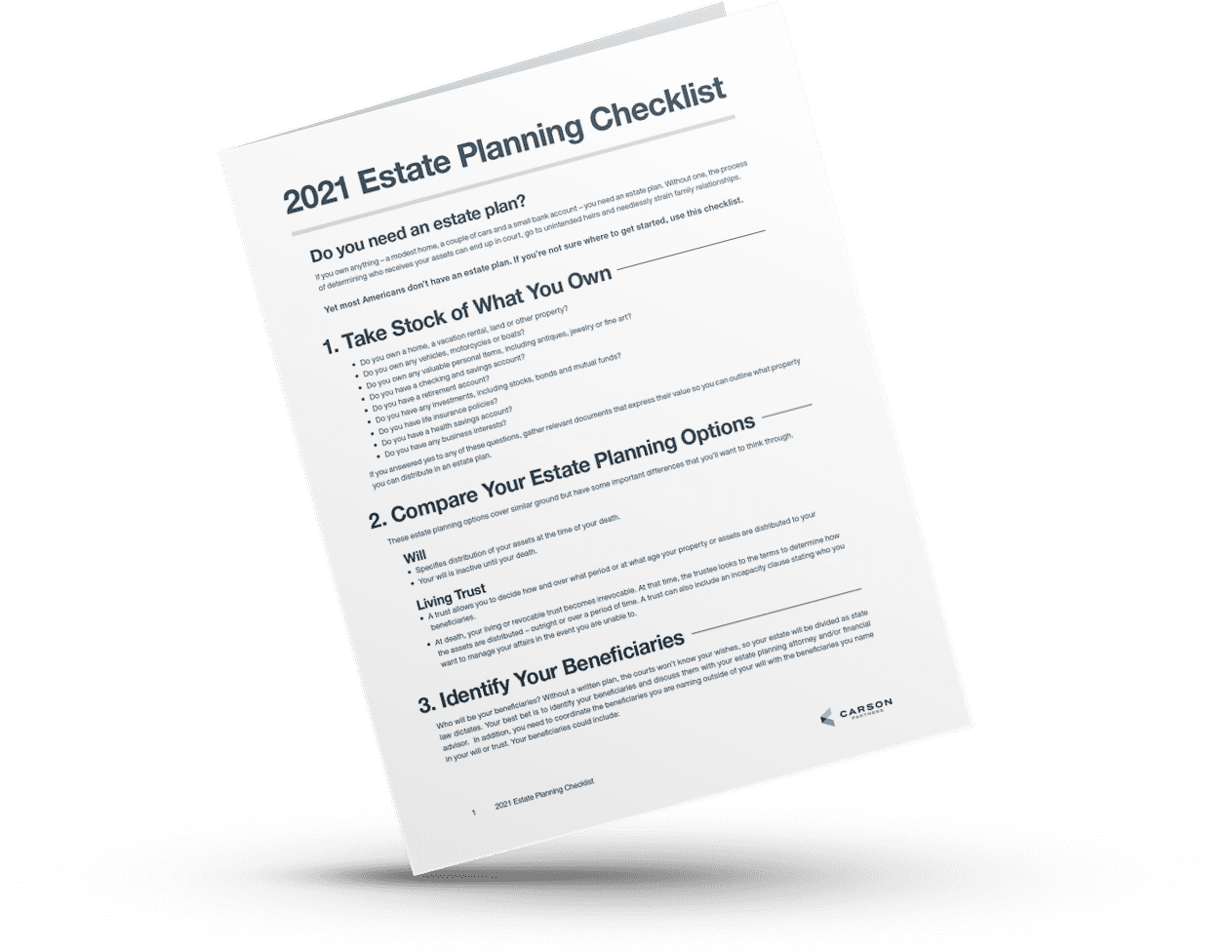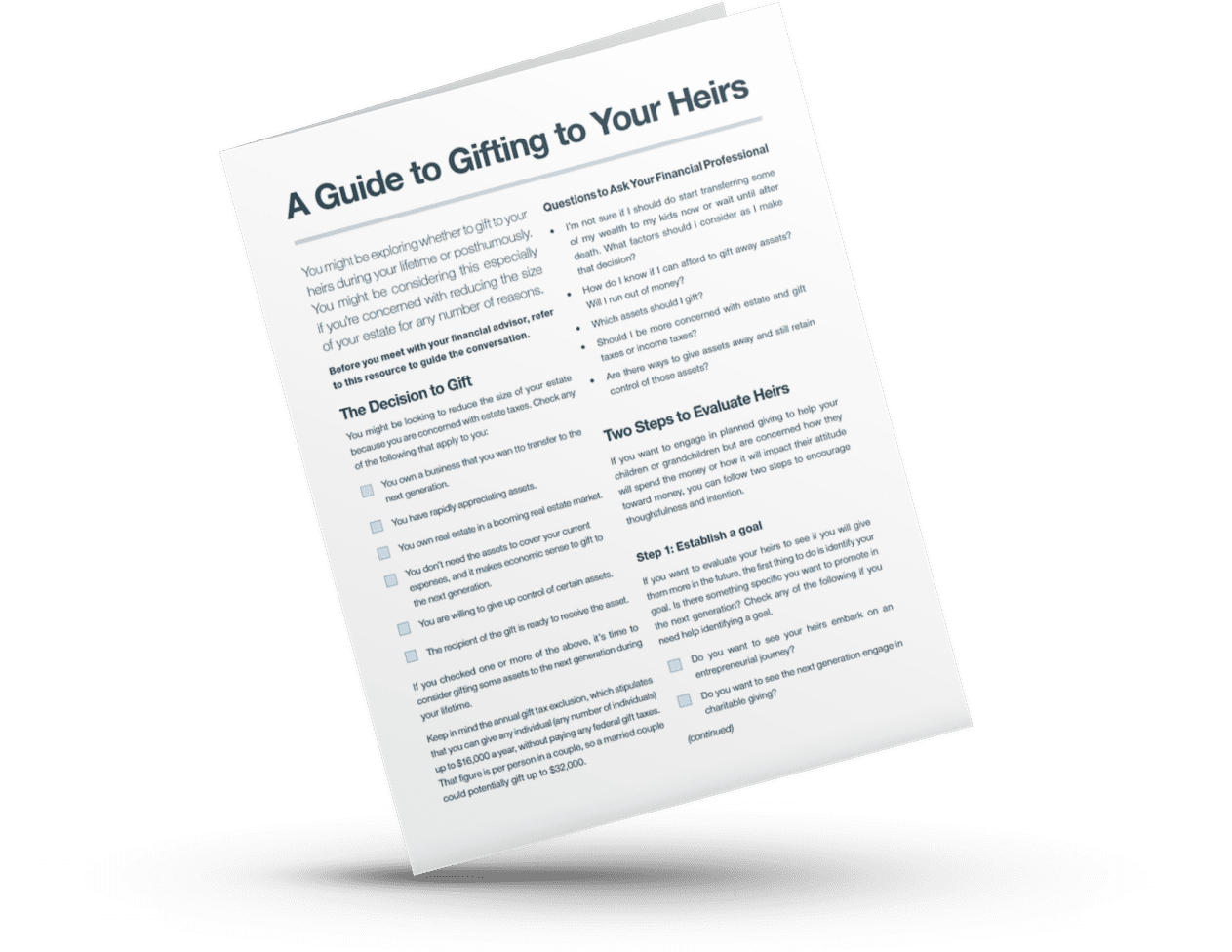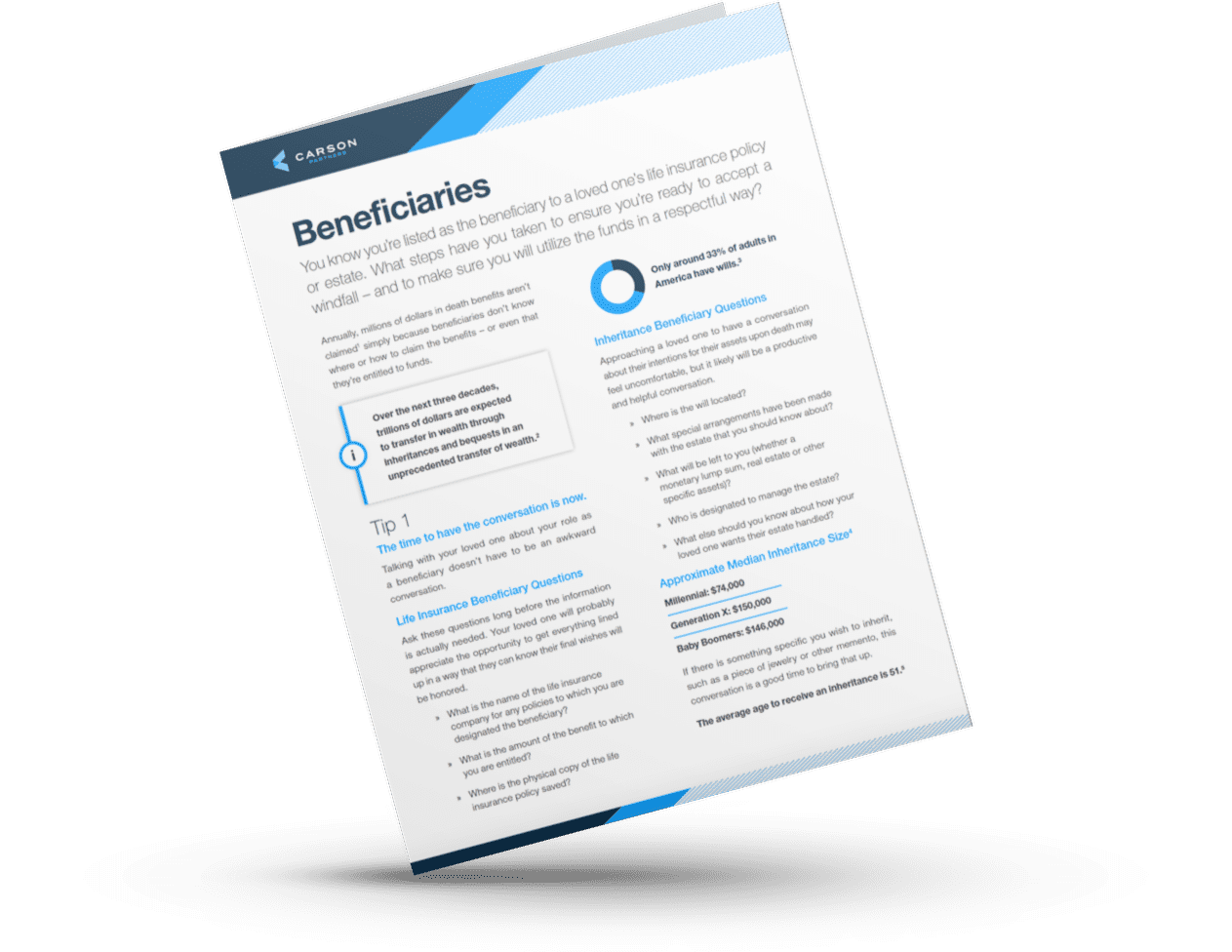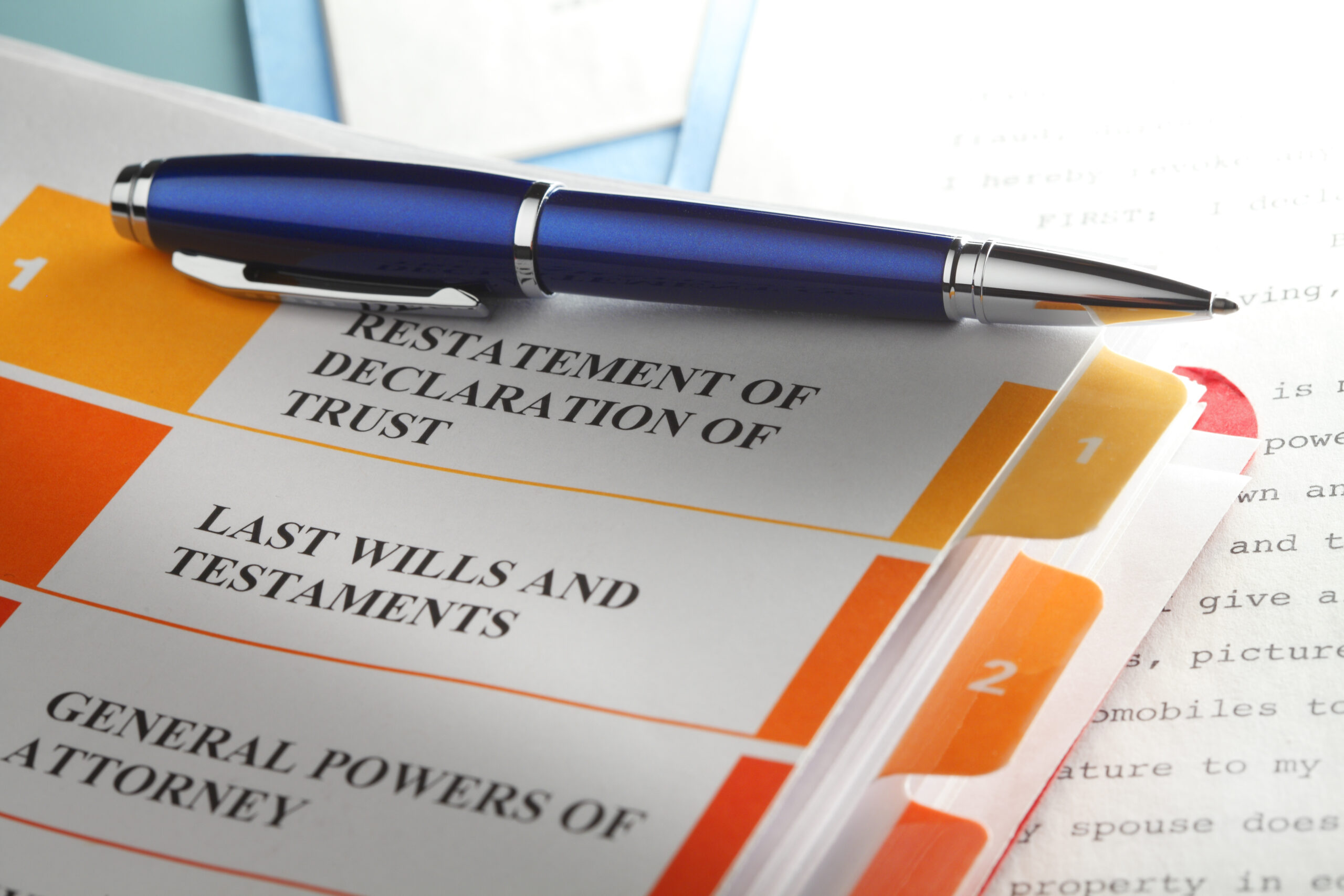How to Pass on Generational Wealth
The Ultimate Guide to Estate Planning


Estate planning demands that we confront our mortality. Perhaps that’s why so many of us put the process off and ultimately fail to plan for the future. But the reality is that family estate planning isn’t about you – it’s about the people you love most.
Much stands to be gained – or lost – with this important tool. If you think you don’t need even the most basic of estate plans (i.e., a will), it’s time to think again.
That’s why we’ve put together this comprehensive estate planning guide. You’ll get an overview of the estate planning process, the estate planning tools you should consider, what it’s like to work with an estate planning attorney, how to get started and more.
What is Estate Planning?
Despite the presumed grandeur of the phrase, estate planning is simply outlining three things:
- Who gets what when you die
- How your affairs should be handled if you’re incapacitated
- Who should execute your wishes

Who Needs an Estate Plan?
Estate planning is often misunderstood as being only for the wealthy. If you have an income, a car, a home, investments, a bank account, or any combination of these things you have an estate – and you need an estate plan.
Despite the need, only one-third of Americans say they have a will or living trust.1 The ramifications of avoiding this important area can be monumental and the benefits vast.
Dividing assets without the guidance of a legal document could cause significant strife within your family. Who is responsible for selling your home? What if your son wants to move in, while your daughter would prefer to turn the home into a rental? Who receives your valuable family heirlooms and sentimental keepsakes? Who’s driving away in your car? Who’s taking ownership of your lake house? These disputes can lead to costly, drawn-out legal battles, draining your loved ones of time, money and emotion.
Beyond that, you also risk leaving your assets to unintended beneficiaries. In some states, for example, if you are married and die without a will, your spouse wouldn’t receive all of your assets if you have children.
Even if your loved ones can divvy up your property without disagreement, your assets can get tied up in probate – a time-consuming public court process – if there’s no estate plan in place.
Estate Planning Goals
An estate plan can help you accomplish the following goals:
- Name the family members, loved ones and organizations or groups you want to receive your property following your death
- Transfer your property expediently, with as few legal hurdles as possible
- Name the person or the institution – ideally a fiduciary who is obligated to act in your best interest – that can act as your proxy, settle your estate, and distribute your assets
- Outline the type of medical care you do or do not wish to receive, should you become incapacitated
- Express your wishes and preferences for funeral arrangements and how related expenses will be paid
- Minimize or eliminate estate taxes
Wills and trusts are the two primary estate-planning vehicles that can help accomplish these goals. While a will is an important planning tool in distributing your assets, it isn’t designed to offer certain protections available under a trust.

Have Questions About Estate Planning?
Talk to a qualified financial advisor today to get the professional advice you deserve.
Need help finding a financial advisor in your area? Give us a call today so we can
match you with an advisor who will put your needs first.
Estate Planning and Wills
If you die without a will, you’ve assumed the government knows best. Everything you own will be distributed based on state statutes. But the law doesn’t know you, your loved ones, your values or your wishes.
A will puts you in the driver’s seat and eases the burden on your loved ones during what is already a difficult time.
What Is a Will?
A will is a legal document that spells out who will receive your property upon your death. But several other benefits come with establishing a will that go beyond that primary function.
Other Possible Functions of a Valid, Up-to-Date Will:
- Potentially reduce unnecessary legal fees. Reducing legal fees can help protect the value of the property and assets passed to your beneficiaries.
- Expedite the legal process. It’s faster, and generally less stressful, to settle an estate with a valid will in place. It can be the difference between settling the estate in a few months or extending the process beyond a year.
- Appoint an executor. An executor oversees and manages the distribution of your estate. It’s not a responsibility to take lightly. Designating a trustworthy and impartial executor provides peace of mind that the terms of your will and your wishes will be honored. If you don’t have a will, the state will appoint your executor.
- Appoint a guardian for minor children. In the event of the death of both parents, a will can determine the care of minor children.
- Help reduce confusion among loved ones. An up-to-date will that clearly outlines how you want your property to be distributed leaves less room for family disagreements that could arise when your loved ones are left to figure it out for themselves.
Wills and the Probate Process
An estate distributed by a will must go through the probate process. Probate is a public court process governed by the state that accepts the will as a valid legal document. Assets – including cash, real estate and personal property – are subject to the probate process, which can be time-consuming and expensive.
You can potentially avoid probate by setting up a trust or through assets with beneficiary designations, such as those listed on your 401(k). An estate planning attorney can help you determine the right path in that process.
Estate Planning Tools to Pair with Your Will
Wills aren’t an all-encompassing estate planning vehicle. So it’s important to consider
to address how your estate and/or health care is managed if you are alive but unable to
make decisions, often due to injury or illness.
These important legal documents that work in conjunction with a will include:

General Power of Attorney
This is perhaps the most important legal document you should consider, even above a will. If something happens to you, and you can no longer manage your affairs – think paying your bills – you need someone to step in who has the legal authority to act on your behalf. That can only be done if you have a power of attorney.
The powers granted in a POA also include handling financial and business transactions, buying life insurance, settling claims, operating business interests, making gifts and employing professional help.
A general power of attorney is also an effective tool if you will be out of the country and need someone to handle certain matters.
Durable Power of Attorney
This legal document has a durability provision to keep the current power of attorney in effect. Many people rely on a durable power of attorney to prepare for the possibility that they may become incapacitated due to illness or injury. The Durable POA might specify that it cannot go into effect until a doctor certifies the grantor as incapacitated.
Financial Power of Attorney
This POA gives a person the authority to manage financial and legal matters. It may be granted for a limited time or for specified circumstances only.
A Living Will
Also known as a directive to physicians or advance directive, this is a document in which you state your wishes for end-of-life medical care in the event that you are unable to participate in decisions.
Healthcare Power of Attorney
This is a type of advance directive in which you name a person to make healthcare decisions for you when you are unable to do so. Sometimes this is called a durable power of attorney for healthcare or a healthcare proxy.

Estate Planning Checklist
Use our checklist to help get your estate plan started.

A Guide to Gifting to Your Heirs
Get helpful information that can guide you through the process of gifting an inheritance.

Beneficiaries
Provide this document to your heirs to help them prepare to manage their inheritance.
Estate Planning and Trusts
While a will can determine who may receive your assets outright, trusts act as a more customized, all-encompassing, and multipurpose planning tool that can also help beneficiaries avoid the cost and hassle that comes with probate.
Benefits of a Trust
Trusts have a variety of benefits when added to an estate plan. Here are a few you may want to consider:
- Properly funded trusts can help avoid probate. In many states, the probate process is slow and expensive – and public.
- Protection from creditors. Holding assets in a trust can help protect that inheritance against potential losses.
- Taking pressure off your loved ones. Trusts protect family members who are not accustomed to dealing with financial matters. They can also provide support for spouses and children, which is particularly helpful for blended families.
- Protecting assets after divorce. Trusts can offer certain protections in the event of divorce, as trusts are not considered marital property, or other litigation.
- Providing for domestic partners. Trusts can sometimes offer better protections to same-sex couples and cohabitating partners – relationships that might not be recognized the same way by state law, depending on where you live.
- Providing funding for specific needs. Trusts can help ensure that funding is available for things such as your heirs’ education and healthcare or to give to charitable causes.
What is a Trust?
Under a trust, instructions dictate exactly how and when to pass assets to beneficiaries. This can be very important when beneficiaries are minors, or if you want to outline specific parameters for how and when adult beneficiaries can access assets. For example, maybe you want your grandchild to finish college before inheriting the property you reserved for them. Or maybe you want to control how much money your spendthrift son can access after your death.
Unlike a will, a trust includes an incapacity clause that states who you want to manage your affairs if you experience a significant medical issue that interferes with your ability to make decisions.
For most people, the primary objective in establishing a trust is to help ensure assets are protected, managed and distributed in accordance with their wishes when they are no longer able to make decisions due to incapacity or death.
Types of Trust
All trust types fall into one of two categories: revocable trusts and irrevocable trusts. These serve different purposes, with their own benefits and drawbacks.
A Revocable Trust
A revocable trust, also called a living trust, can be modified or terminated during your lifetime. Any earnings generated by assets held in trust are reflected on your income tax returns.
You can manage the financial assets in the trust or hire a financial advisor to manage your assets following trust provisions.
A revocable trust, like a will, can also be used to transfer assets at death. Once you die, your wishes are final and the trust becomes irrevocable. Your assets are then managed and distributed by your trustee, in accordance with the instructions outlined in the trust.
An Irrevocable Trust
As a general rule, an irrevocable trust cannot be modified or terminated – before or after your death – without involving the court and/or hiring an attorney to determine other legal pathways in your state that might allow you to make changes.
In most cases, an irrevocable trust is a separate legal entity and its own taxpayer.
Irrevocable trusts are often created before death to move assets out of someone’s estate that might be subject to estate tax. They are often used to hold life insurance policies, gifts of assets to beneficiaries at a future date or funds for future charitable donations.
Common Trusts
- Survivor’s Trusts are created by an individual during their lifetime to provide for a surviving spouse, domestic partner or other loved one(s).
- Guardianship Trusts are established to protect and handle the assets of minors.
- Generation-Skipping Trusts, or Dynasty Trusts, provide distributions for the benefit of a child for life, with the remainder continuing on to grandchildren, or more remote descendants.
- Special Needs Trusts are established to ensure any supplemental or living expenses are paid through a disabled person’s lifetime that are not paid by other sources.
- Charitable Remainder Trusts are irrevocable trusts. Income is paid to designated beneficiaries for a certain term or lifetime. The remainder interest is paid to qualified organizations as specified in the document.
- Private Foundations are charitable organizations created and funded by a donor as a trust or a non-profit organization.
- Irrevocable Life Insurance Trusts or ILITs may be used to shelter an insurance death benefit from estate taxes and may provide liquidity to pay estate taxes, settlement costs and/or equalize distributions among beneficiaries.
- Credit Shelter Trusts allow married couples, who may have to pay estate taxes, to reduce those taxes by taking full advantage of state and federal estate tax exemptions.
Estate Planning and Your Legacy
Estate planning can and should go beyond who gets what. It’s important to consider your core values, your belief system, what you want to pass on to not just your loved ones but to your community. What’s important to you? How do you want to be remembered? What legacy do you want to leave?
For many, this is where charitable giving comes into play. No matter the size of your estate, if your heart is in certain causes, you can decide to give to those causes upon your death.
When it comes to philanthropic planning, we should give in a way that makes the most impact. For example, giving $100 to $1,000 to several organizations is likely not as impactful as giving $100,000 to one organization you are passionate about.
A financial advisor can help you determine what organizations and charitable giving vehicles align with your values. They can help you calculate a plan to donate to important causes in a way that maximizes your generosity and offers you and your beneficiaries the greatest tax benefits.
Philanthropic Giving and Your Estate Plan
With charitable remainder trusts, donor-advised funds and private foundations, you can plan and honor your legacy.
Charitable Remainder Trusts
Charitable Remainder Trusts are a tax-efficient tool that enable you to give to important causes while also sheltering your beneficiaries from capital gains tax for a certain term of years. Every year of your beneficiaries’ lives, they are paid an annuity from your CRT, giving them consistent income over several years. The “remainder” goes to charity, typically 40-60% of the trust’s value but as little as 10%. Under this trust, you can leave a legacy of giving that models values for your children and grandchildren.
Donor Advised Funds
Donor-Advised Funds preserve your funds for charitable causes while potentially reducing tax liability. The fastest growing charitable tool, a DAF, is run by 501(c)(3) organizations that invest the donations and manage the account. You can name your DAF as a primary or secondary beneficiary in keeping with your legacy plan. Retirement assets left to charity, including via donor-advised funds, are protected from taxes, so your distributions can make a bigger impact on the causes you care about. In addition, your children can take over some DAFs when you are no longer here or able to manage the fund.
Other Philanthropic Strategies
Other philanthropic planning strategies can include qualified charitable distributions (QCDs) and private foundations, both of which are vehicles to exercise your generous impulses with their own benefits and restrictions. Your financial advisor and estate planning attorney can walk you through these options and what best aligns with your goals.
Creating your Estate Plan
One of the biggest questions to ask yourself before you dive into your estate plan is whether you should tackle things on your own or work with a qualified professional. Let’s explore both options.

DIY Approach
Online will-creation services are becoming more popular, and while they are typically a less expensive option for those with straightforward estates, that comes at a cost. Online services usually offer a fill-in-the-blank approach. The key to an estate plan is customization and peace of mind. The limitations inherent in online services will make that difficult.
Working with Professionals
An estate planning attorney and/or your financial advisor will have deeper understanding of how to put together a comprehensive estate plan. These professionals will work with you to understand you and your family’s specific needs, asking questions and offering solutions that align with your specific circumstances and goals. They also verify accuracy, ensure the plan complies with the law and can work with your financial advisor to confirm your will coordinates with your financial accounts, your savings plan and legacy wishes.
How Much Will an Estate Plan Cost?
The costs associated with a DIY estate plan are generally one-time, flat rate fees. Some online sites offer things such as wills or trusts on an ala carte basis, while others may have package deals that could potentially save you a little. Others even advertise guidance from online attorneys. The key is to do your research up-front to ensure you’re getting the right services for what you’re willing to pay – rather than a package filled with things you aren’t going to need or advice from someone you haven’t vetted yourself.
If you choose to work with an estate planning attorney, their fees will depend on their experience level and the complexity of your situation and the services you require. While some attorneys will charge a flat fee for certain services – expect to spend at least $500 for a basic will, for example. Others will charge per hour. Some might combine the two fee scales, charging a flat fee for more basic services and charging per hour for anything beyond that.
Ready to Create Your Estate Plan?
Let us match you with an experienced financial advisor who can help you start the process of building a customized estate plan.

This piece is not intended to specific legal, tax, or other professional advice. For a comprehensive review of your personal situation, always consult with a tax or legal advisor.

